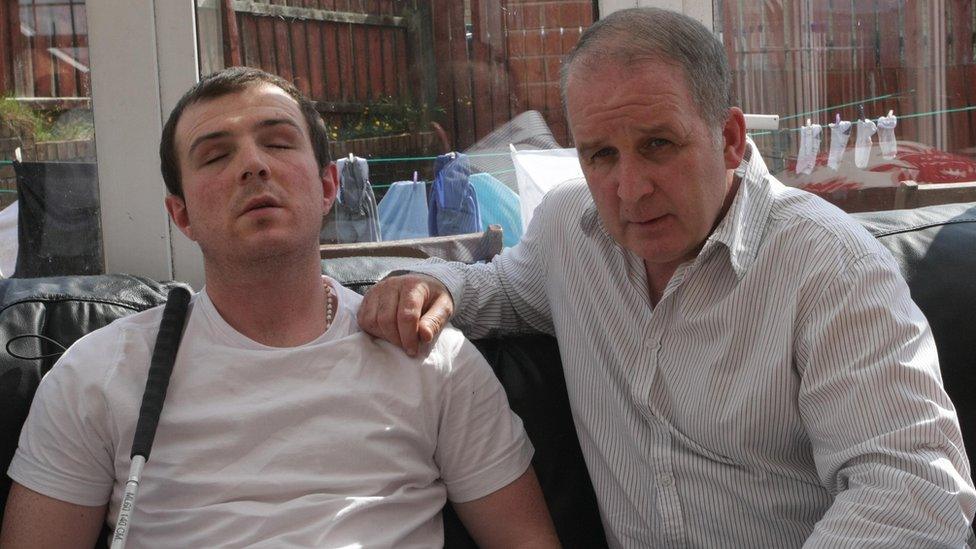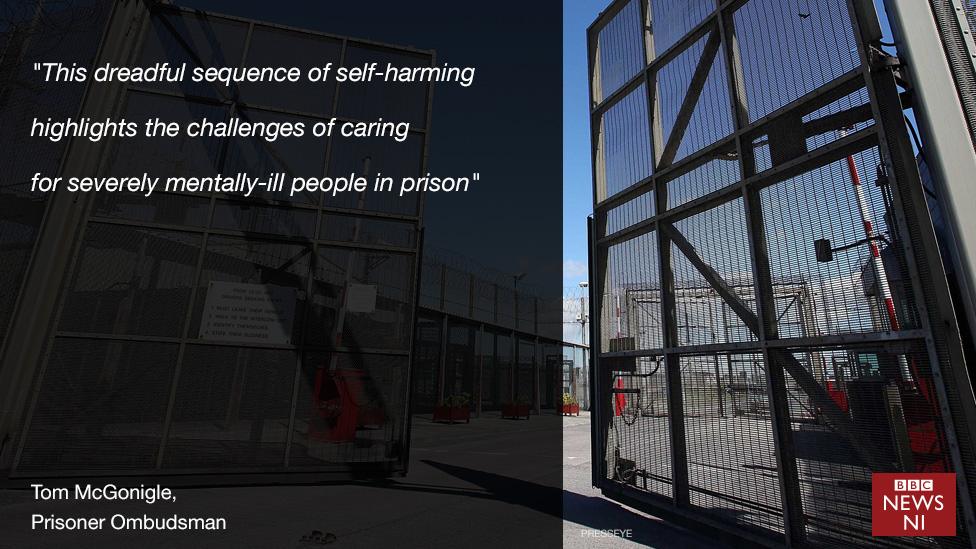Maghaberry Prison staff 'watched' as inmate blinded himself
- Published

Sean Lynch, pictured with his father Damien who said the ombudsman's report offered 'no comfort'
Prison staff who watched but failed to intervene as a mentally ill prisoner blinded himself and injured his groin area have been strongly criticised.
A report by NI's Prisoner Ombudsman, external has said Sean Lynch inflicted "extreme and shocking" self-harm over three days.
The 23-year-old was held in Maghaberry Prison, a high security jail.
Mr Lynch's father said the recommendations in the report offered "no comfort."
The report said on the final day, two prison officers watched as he injured himself on more than 20 occasions in an "ordeal" that lasted for over an hour.
'Crying in pain'
Prison officers "directly observed" the inmate for more than a quarter of the time, the report added.
CCTV cameras showed Sean Lynch shouting and crying in pain and banging his cell door, but the officers did not try to stop him.

Inmate Sean Lynch inflicted 'extreme and shocking' self-harm over a three-day period at Northern Ireland's high security jail, Maghaberry Prison
"It seems remarkable that several experienced Northern Ireland Prison Service officers, including a senior officer, all felt it was neither necessary nor appropriate to enter his cell to prevent Mr Lynch from self-harming further," said Prisoner Ombudsman Tom McGonigle.
Damien Lynch said his son had been neglected by the system
"Their duty of care was trumped by security concerns that appear to have had little basis in reality."
Sean Lynch used his fingers and thumbs to damage his eyes, and claimed to have used a piece of broken glass to injure his groin.
Mr Lynch's father Damien told BBC's Nolan Show that "everything had been taken" away from his son.
"His sight is completely gone, his life is completely gone," he said.
"I have no faith, I don't think anyone would have any faith if this had happened to their son."
'Bizarre behaviour'
The director general of the prison service, Sue McAllister, said it was the most extreme case of self-harming she had experienced in 30 years working in prisons.

Sean Lynch used his fingers and thumbs to damage his eyes, and claimed to have used a piece of broken glass to injure his groin in the jail outside Lisburn, County Antrim
She said it was a "shocking and tragic case" and said her thoughts were with Sean Lynch and his family.
"But this is not about apportioning blame or apologising," she said.
Mrs McAllister said it was not possible to say what staff "could or should have done" in this "unprecedented incident."
"Our staff on that day, and in the days leading up to incident had cared for Sean in very caring and professional way."
"But this case also highlights just how challenging and complex the work of our staff is every single day."
Blinded prisoner: Criticism of Maghaberry staff 'not fair'
She offered to meet Sean Lynch and his family if they wished.
The report said the incident in June 2014 followed the deterioration of Mr Lynch's mental health in the community "and increasingly bizarre behaviour in prison".
It identifies serious shortcomings in the treatment of Mr Lynch, who had a history of drug and alcohol abuse and mental illness.

A detailed Forensic Medical Officer's assessment, suggesting that formal psychiatric assessment was an "absolute necessity", was sent to Maghaberry Prison.
Despite this, the prisoner was treated as a "routine" referral, said the Prisoner Ombudsman.
'Restrained'
Mr McGonigle added that the problems may have been compounded by an eight-day delay in administering an increased dosage of medication that was prescribed.
The report stated that while numerous staff from the prison service and the South Eastern Health and Social Care Trust dealt with Mr Lynch, "nobody took overall responsibility for managing him, either as a patient or as a vulnerable prisoner".

Justice Minister Claire Sugden said the process 'was not designed to care for someone as challenging as Mr Lynch'
It said a priest who visited the prisoner in Maghaberry noted: "His condition is beyond anything the officers can cope with."
The Prison Ombudsman also noted that Mr Lynch's "self-destructive behaviour" had required treatment at outside hospitals.
The report said his conduct was so challenging "he had to be restrained and tranquilised, and he seriously assaulted a prison officer".

The report has made 63 recommendations for improvement by the Northern Ireland Prison Service and the health trust.
"This dreadful sequence of self-harming highlights the challenges of caring for severely mentally-ill people in prison," said Mr McGonigle.
"The key messages from this investigation are the need for someone to take prompt and effective control when a prisoner/patient's mental health is deteriorating rapidly; and for improved assessment and information-sharing at the point when people go into prison."
'Awful case'
The justice minister and director general of the prison service have both said the report highlights the difficulties managing a prisoner with severe mental illness.
"This was an awful case for everyone concerned and I am deeply sympathetic to Mr Lynch and his family," said Justice Minister Claire Sugden.
She said that while prison staff are trained to support and care for vulnerable prisoners, the process "was not designed to care for someone as challenging as Mr Lynch".
The minister and prison service director general both said lessons will be learned and that recommended improvements for dealing with vulnerable prisoners will be implemented.
- Published14 September 2016

- Published26 August 2016

- Published5 November 2015

- Published6 August 2014
